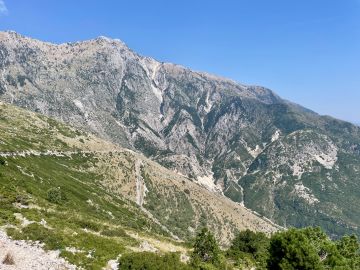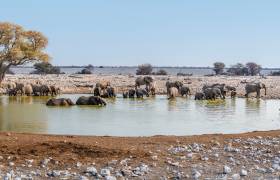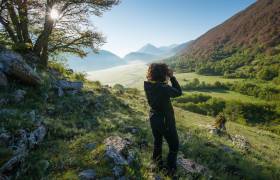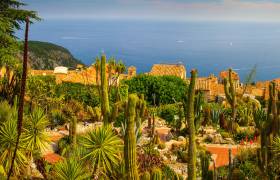A country of untamed natural beauty, you’ll find that Albania is also steeped in history, from its ancient Illyrian roots to its darker communist past, making it a fascinating, and relatively untouched gem in the Balkans to discover. Exodus customer, Marcia Summers, was intrigued by the history of Albania and recently decided to join our expert local guide and likeminded-travellers on our Cycling in Albania adventure, which took her from Pogradec, near the Macedonian border, along the stunning Albanian Riviera and towards the beach town of Vlorë overlooking the Adriatic. Read on as she explains why Albania should be at the top of your list for your next cycling trip.

“Crazy about cycling and with a strong taste for adventure, last year I ventured solo to join a group cycling trip through Jordan with Exodus Travels. It was there – at the airport – I met another woman headed for the same trip. We had such a fun time in Jordan we decided to book another Exodus holiday. Flipping through the travel brochure, trying to decide our next destination, Albania caught our eye.
Neither of us had been before, it felt like a mystery. What’s more, it looked like good value for money. Seven days with six of them spent cycling, and all less than a three-hour flight from Heathrow – seemed irresistible.
Admittedly, Albania was a bit of an enigma to me – I had heard snippets about a troubled past, of a country hundreds of thousands of people had fled in search of a better life. When I shared my travel plans with family and friends I encountered some raised eyebrows. Some compared it to a present-day North Korea – completely closed off for decades. Others mentioned the name Enver Hoxha, Albania’s long-reigning brutal Communist dictator, of whom I’d not heard. Yet despite the ominous comments and my own curiosity about its dark history, I felt drawn to understand what the country truly had to offer.

No one had warned me about its breathtaking landscapes – its soaring mountains, lush valleys and stunning coastlines – except of course the Exodus Trip Notes! All I heard were the echoes of its painful past. But as I continued delving into my research, and as the trip approached, I realised the country I was about to discover was much more than the sum of its scars.
When I’d booked the trip, it had been graded “moderate”, but to my surprise, a couple of months before we left, it was reclassified as ‘challenging’. Would my legs hold up? I live near the Surrey Hills, so I started cycling every weekend to prepare, determined not to be left behind.
Some in our group opted for e-bikes, which made the steep climbs easier – but I was set on conquering those mountains under my own power. E-bikes proved a good option for those wanting to enjoy the experience of cycling and the beauty of the mountains without too much pain and exhaustion.

We touched down in Tirana, Albania’s capital, and from the moment we transferred out of the city towards Pogradec, I knew I was in a place like none other I’d been to. Towering concrete apartment blocks lined the horizon, a bleak reminder of Albania’s Communist era which ended under Hoxha’s successor Ramiz Alia back in 1991.
As our transfer coach coasted along the main road, I began reading Margo Rejmer’s ‘Mud Sweeter than Honey: Voices of Communist Albania’, a book I’d been gifted for my birthday the previous month. Its stories of oppression – and unimaginable suffering – gave a voice to ordinary people who lived through Hoxha’s totalitarian regime and its aftermath. I was beginning to get a picture of the background of the people, places and policies which made modern Albania, Albania.

The next morning, we set off on our bikes from the lakeside town of Pogradec, just a stone’s throw from the Macedonian border, and ascended more than 1000m of mountainous climbs. The rugged beauty of Albania’s interior unfolded before us as we cycled through the Barmash Pass towards Germenj, very close to the Greek border. The air was fresh, the mountains unspoiled. The bleak-looking, concrete tower blocks already felt in the distant past.
As I pedalled along the sharp, spiralling bends and thrilling descents, I couldn’t help but imagine the people who had once tried to escape across the mountains that lay before us. People fleeing for their lives, were often captured, tortured, or killed by the Sigurimi, the Communist Party’s state security – known for being one of the most repressive and brutal agencies to have ever existed. It felt quite sobering, cycling through history like that. Each day brought new discoveries though.
We stopped in remote villages and at monuments honouring Albania’s fierce resistance against the Nazis in 1944. Our guide, Demitri, told us we were following the very route once used by Nazi troops in their attempt to capture Albania.
At Sotira, deep in the country’s interior, we stayed at a farm tucked away in the mountains, complete with goats, sheep and a working trout farm. The simplicity and serenity of rural Albania was almost timeless. Watching goat herders and shepherds tend their flocks felt like peering into the past, into a life unchanged by time and turmoil.
The countryside proved to be one of the highlights for me in terms of place – it was totally authentic, with friendly people and the freshest of air. Goats, sheep, horses and cockerels surrounded our small cabins that night as we all drank mixed fruit juice and homemade wine and ate deliciously fresh trout with roasted vegetables.

Exodus Travels had partnered with local guides like Demitri from Cycle Albania, giving us an immersive experience whilst supporting local communities too. Our staying at small locally owned accommodation helped to empower rural villagers to protect their natural environments – a key aspect of Exodus Travels’ environmentally-friendly mission.
Midway through our trip, the temperatures cooled from the low-30s to mid-20s, and the climbs became less steep for the next couple of days. We rode through gorges, over bridges and alongside one of the oldest wild rivers in Europe until we reached the Ottoman town of Gjirokastra. Here, we wandered through its cobbled streets and visited the medieval castle – marking centuries of suffering. Most recently though the castle had been used as a prison of torture under Enver Hoxha’s brutal, dehumanising regime. It felt quite eerie walking around the castle and as we did so it started raining, creating an even more oppressive atmosphere.

On one of our final days, we cycled down a mountain towards the Ionian Sea. The air grew rapidly warmer, and the landscape was more Mediterranean than Balkan. A highlight for me was a visit to the Hellenistic archaeological site of Butrint, passing over a floating bridge that connected us to a city believed to have been founded by exiles from Troy, in c.1180 BC. By the time we reached the coast, the sun was setting, casting a golden light over the sea and the Greek island of Corfu – just 6 miles away.
One thing that struck me was how few churches and mosques we passed. Those we did looked newly built, and the few older looking churches were tiny or in very remote locations. Hoxha kicked God out of Albania in the 1960s when he banned religion completely. If the Sigurimi found as much as a Bible, Koran or other religious book in someone’s home; or if someone was reported for praying or worshipping in any way, then punishment, exile, imprisonment or even torture – for being an “enemy of the people” – could follow.
If you are interested in learning more about Albania’s past, Margo Rejmer’s book mentioned earlier and Lei Ypi’s ‘Free’ are a must. They helped me better understand ordinary Albanians’ experiences – living both under Communism and after the fall of the regime. Only since the downfall of Communism in 1991 has religion been able to be practised openly.
Perhaps most surprising for me was learning that the saint Mother Teresa – real name Anjeze Gonxhe Bojaxhiu – was born in Albania – a fact I only learnt from my wider reading.

Throughout our journey, the remnants of Albania’s terror-filled past were never far from sight. Concrete bunkers dotted the landscape like sentinels, each one with a narrow gun slit watching us as we cycled by. It’s believed that Hoxha built between 173,000 and half a million of these between the early 1970s and 1984 in his paranoid attempt to protect the country from invaders – illusory enemies who never came.
This wasn’t just a cycling adventure – it was quite a revelation. It was a chance to experience a country that had been closed off for so long, to connect with its people, and to learn about its complex history firsthand.
Albania, with its wild beauty, its echoes of a Kafkaesque past filled with repression, fear and isolation – yet with indomitable hope for the future too, has left its mark on me. What a privilege it was to explore this resilient and awe-inspiring country in a more intimate way – on two wheels.”
If Marcia’s experience has inspired you to discover Albania for yourself, find out more about our Cycling in Albania trip or discover more adventures in Albania here.




